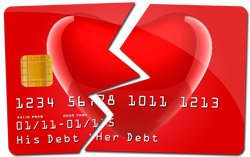You divorced the fool…unfortunately not his debt…now what?
‘Till death do us part or ’till debt do us part?
There seems to be a common misconception about debt and who in a relationship is responsible for it. I’d like to take a few moments of your time and clear up some misconceptions if I may.
First and foremost, debt is a contractual obligation. That means if you sign on the dotted line, as the primary borrower, or the secondary borrower, or the guarantor, you are legally responsible for that debt.
So, you enter into some credit obligations with your spouse – a mortgage, line of credit, credit cards, etc. Life is good and then the unthinkable happens, life stops being so good, you can’t stay together any longer and still maintain your sanity, so you separate. You amicably decide whose paying what (because that’s the way it always happens – NOT!) and start your lives apart.
And then he (or she) stops paying their obligations. Did I mention that just because your separation agreement states your ex is responsible for certain debt, you are not legally released from the obligation to pay? If your ex stops paying, the creditors WILL start calling you.
The following are some steps you can take to fully understand where you stand financially and what you can do to protect yourself.
- Make a list of all your credit obligations. The amount owing, account number and contact details.
- Gather the credit contracts and review them to ensure (1) you signed on the dotted line, or (2) you obtained a spousal card and have obligations to pay
- Obtain a copy of your credit reports from both Equifax and TransUnion to ensure you know what accounts are being reported on your file (this will give you some indication as to what you are responsible for)
- Set up an emergency pay account if your budget allows you to. Put a little away every month in the event your ex stops paying so you can have some time to evaluate your options and not destroy your credit rating
- If your ex is staying in the home and maintaining a joint mortgage or keeping the car and paying a joint car loan, ensure the lender is aware that you want to be notified of any missed payments immediately. Set up online accounts so you can periodically check the status.
- Remove your name from any joint accounts and open your own account
- In the event you feel you will be responsible to pay debts you cannot afford, seek professional advice asap to avoid any unnecessary marks against your credit file.
Of course prevention is the key. It’s always a good idea to maintain your credit in your name and have you partner have their credit in their name, but in reality, most lenders require both spouse’s signature and let’s face it, who starts a relationship anticipating it’s demise.
Be aware, be knowledgeable and be resourceful!
Have a question? Ask Dr. Debt!







